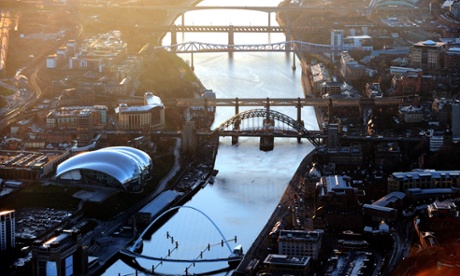
It comes as no surprise to the Geordies that Newcastle is rated one the UK’s best performing cities. I left in 1990 when the city (and most of the north-east) was on its knees, but the city I see on my visits home is revived, emerging as a poster child for the new north. A recent Centre for Cities report ranked Newcastle eighth among the UK’s largest cities in terms of jobs growth – attracting nearly 30,000 new jobs between 2004 and 2013 (an 8% increase), and belying the report’s overall message of a widening north-south divide.
The revived Quayside is testament to the city’s determination to rebuild itself after the devastation of 1980s deindustrialisation. Building on the work of neighbouring Gateshead in promoting its Garden Festival, Sage culture centre and Millennium Bridge, Newcastle published Going for Growth, an ambitious, city-wide regeneration strategy, back in 2000. Seeking to position itself as a competitive, cohesive and cosmopolitan city of international significance, it built partnerships with citizens, communities, companies and government – and even bid to become European City of Culture, achieving a level of exposure overseas despite losing out to Liverpool.
Now a new group aims to promote a vision for the city that is nuanced, recognises its unique assets, and is not afraid to fight its corner. According to Mark Tewdwr-Jones, chair of the Newcastle City Futures Development Group, which draws together the city’s two universities, its private and voluntary sectors, the council and the region’s Local Enterprise Partnership: “For a city within a region built on manufacturing, it seems highly inappropriate for Westminster to suggest an economic strategy for Newcastle which rests on financial and professional service sectors alone.”
Tewdwr-Jones believes the north-east, centred on Newcastle, should be promoted in a number of distinctive ways – including as a globally renowned centre for electric vehicles with the growing automotive industry, high-speed train construction (a factory is being built in Newton Aycliffe for the new InterCity Express trains), and harnessing tidal energy – all of which will rely on the highly skilled north-eastern workforce.
Collaboration and future thinking, then, are two vital aspects of Newcastle’s regeneration. There is a long history of partnership-working in this part of the world: as well as the physical regeneration of the Quayside, it has also resulted in the success of the region’s Metro system. Extended to Sunderland in the early 2000s, this rapid transit is cheap, reliable and links key employment sites with the population centres of the region. There are ambitious plans to extend it to Washington New Town and the deprived west end of Newcastle, and develop a new linked rail passenger service into south-east Northumberland.
Washington resident Eddie Palmer has been involved in discussions about the Metro extension, and says this is part of “the north-east having to work hard at local solutions in the absence of any real help from Westminster”. To him and many other north-easterners, this part of the world has been ignored for so long that self-reliance is bred into the local psyche.
To underline the point, Palmer reminds me that the Domesday Book doesn’t even mention the north-east of England, adding that the region’s long history of peripherality that must be addressed. He says talk of Manchester as the centre of a new “Northern Powerhouse” is laughable, given that “it’s in the Midlands and more difficult to get to than London”.
Amid the excitement and optimism about Newcastle’s future, there are still huge hurdles to overcome. Public-sector cuts over recent years have led to anxiety about the robustness of the city’s economic base. Newcastle may have attracted many new jobs over the past decade, but what kind of jobs are they? Many are unskilled, low wage and on zero-hour contracts.
In the same Centre For Cities report, nearby Sunderland is the only one of 64 UK cities to have lost population over the last 10 years. There is also some unease in Newcastle at what further devolution of financial powers to Edinburgh might mean in the future for the region, particularly when the road infrastructure between these two cities is so poor. Will the north-east become even more peripheral with moves towards greater autonomy, or even independence, for Scotland?
Issues of poverty and isolation affect many communities in the north-east, and cannot be ignored if Newcastle is to have a meaningful future. Like other cities – including London – there is a huge divide between a privileged elite and those without access to jobs, services and a good education, and they’re concentrating in particular neighbourhoods.
John Egan, director of children’s services at Action for Children, is concerned that, now the orthodoxy of austerity has been accepted across all sectors, “the need for innovation is more pronounced. Investing in the city’s young people and training them should be part of a coordinated effort to make productive adults who will contribute to the growth of the city in the future, but this requires strategic investment.”
The general election in May will be an interesting test. Newcastle feels remote from London and has traditionally voted Labour. This is an area people feel has been long ignored by the establishment, and there is a clear suspicion that it’s no accident the coalition has been focused on the Manchester city region, given the number of marginal constituencies that are up for grabs there.
Yet there’s a palpable sense of optimism in this great city. Having weathered the more recent recession with a bold vision for the future, Newcastle appears well placed to drive forward the Northern Powerhouse vision, and challenge the dominance of Manchester – and politicians’ obsession with it.
Michael Short is an academic and writer on urbanism, architecture and conservation. He works at UWE Bristol and tweets @drurbanist

